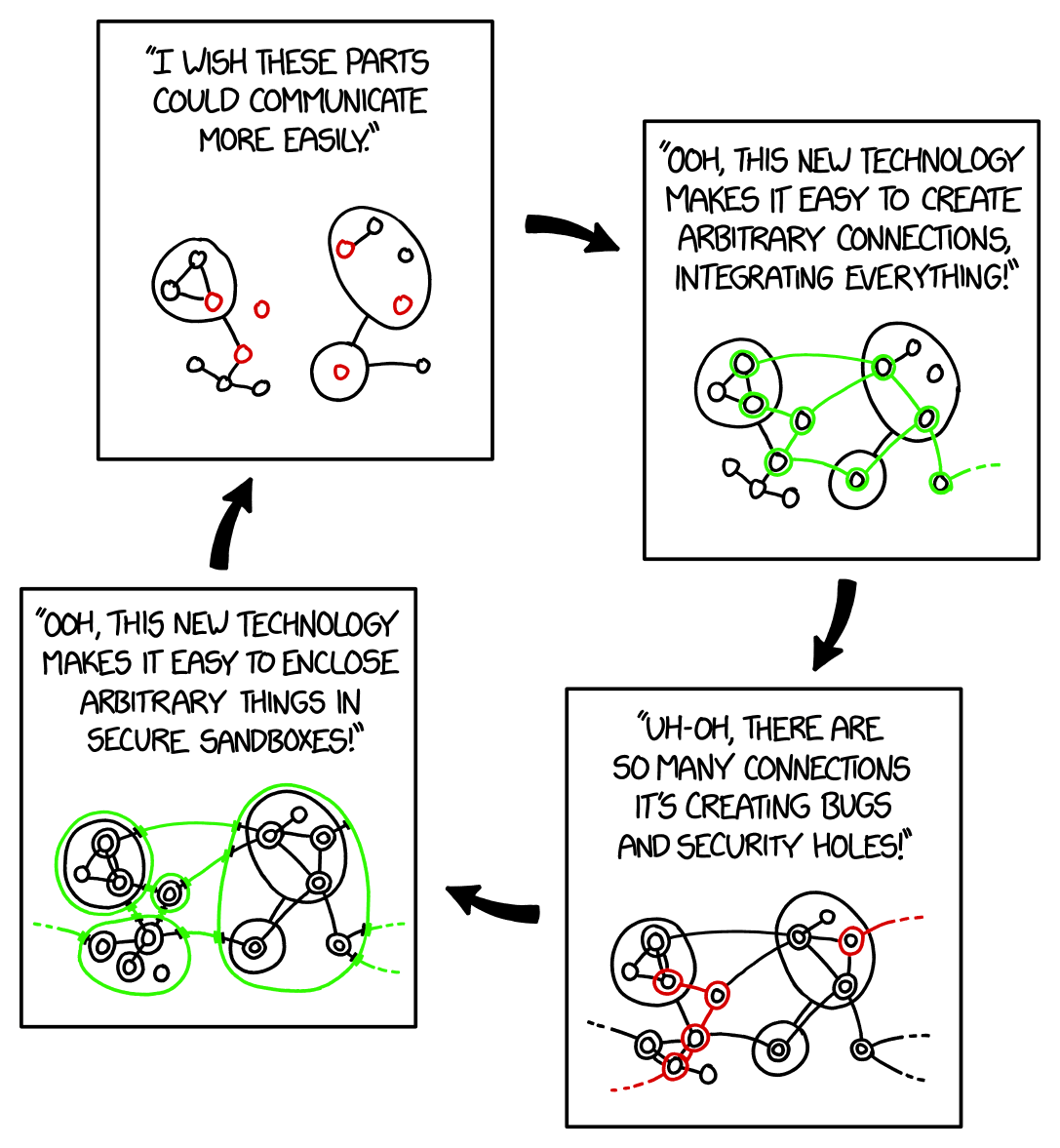POLA Would Have Prevented the Event-Stream Incident
Kate Sills
December 02, 2018

The JavaScript world was rocked this week by news that the popular npm package event-stream included malicious code that attempted to steal the private keys of certain Bitcoin users.

Hacker News
Since the attack was discovered, both the JavaScript community and the cryptocurrency community have been passionately debating how to prevent such an attack. At Agoric, we think this attack was entirely preventable, and the answer is POLA, the Principle of Least Authority.
How would POLA have helped?
Here’s how the attack happened. Dominic Tarr, the maintainer of event-stream and a number of other open source packages, handed off ownership to a volunteer.
This volunteer added a malicious package as a dependency to event-stream. The malicious package was narrowly (and expertly) targeted to only execute in the context of the Bitcoin wallet Copay.
Here’s what’s shocking: any malicious person in control of a widely used package could do something like this again, easily.
A number of different solutions have been suggested — that we need to change our open source culture to pay developers to maintain packages, that we should have better package management — with lockfiles, dependency pinning, and deterministic builds.
These are all good points, but they miss something huge.
An imported package (even one controlled by a malicious agent) shouldn’t have been able to take your private keys in the first place.
Believe it or not, this ideal is actually achievable, and the mechanism for achieving it is POLA — the principle of least authority.
The mistake is in asking “How can we prevent attacks?” when we should be asking “How can we limit the damage that can be done when an attack succeeds?”. The former assumes infallibility; the latter recognizes that building systems is a human process.
— Alan Karp, “POLA Today Keeps the Virus at Bay”, HP Labs
What is POLA?
The Principle of Least Authority (POLA) says that code should be granted only the authority it needs to perform its task and no more. Code has a lot of power. Code can read your files, delete your files, send your files (and all of the information within them) to someone else, record your keystrokes, use your laptop camera, steal your identity, hold your computer for ransom, steal your cryptocurrency, drain your bank account, and more. But most of the code that we write doesn’t need to do any of those things — so why do we give it the authority to do so?
Let’s take a look at how authority is handled in modules in Node.js. Let’s say that I want to import a function that concatenates an exclamation point to the end of the strings. Let’s say it looks like this:https://medium.com/media/69c25590d6701e201041ada5ed85fff7
And then we can import it and use it like this:https://medium.com/media/4fa0e938dfbdec69193d88e4810857e1
This seems fine. And it is! But importing addExclamation could have easily read our Bitcoin wallet and sent our private keys off, if it had instead been written like this:https://medium.com/media/2e4c9cf7fb1a2e756cbe18f180a9b2b5
Well, that seems terrible. And worse, without inspecting the code, you would have no idea that this is happening.
The proposed solutions for this—such as not using any packages that you don’t personally trust, having curated lists of audited packages, etc. — are missing the actual problem: this code had easy access to both the file system and the network, and it didn’t need either.
This kind of easy access is known as ambient authority. I didn’t need to explicitly hand over access to the file system — it was just laying around in scope for any piece of code to pick up. By contrast, in a system that follows the principle of least authority, access is denied by default, and it must be granted explicitly to be able to be used.
The fact that my module didn’t need access to the file system or the network but still had access to them is known as excess authority.
POLA is ultimately about eliminating both ambient and excess authority. It’s not a motto that is meant to be inspirational; POLA can actually be achieved. But how?

POLA cover
POLA — more than a motto!
Locking Down JavaScript
It turns out that JavaScript is especially good at allowing us to cut off access to possibly harmful external effects — much better than other widely used programming languages. In JavaScript, nearly all of the access to the outside world is provided by the host via global variable names. When the host is the browser, this includes global variables such as window and document. Here, the host is Node which provides global variables such as fs and https. This means that by cutting off access to the global scope and global object, we can cleanly cut off access to most harmful external effects [1]. This isn’t the case in a language like Java, where access to the outside world is mixed in with other functionality.
Realms, a proposal to do exactly this, is currently going through the JavaScript standards process. If all is well, it will become part of the JavaScript language. Realms makes it incredibly easy to cut off access to the outside world. For instance, let’s take this troublesome piece of code provided by David Gilbertson. It doesn’t necessarily look like it, but this is a network request:https://medium.com/media/e5b57bfd5edf6a081de41c1738e274f4
In a code review, would this jump out as problematic? Maybe not. As David points out:
“it is very difficult to spot shenanigans in obfuscated code, you’ve got no chance.”
But, if I create a Realm in my browser and try to execute this code inside it (Test it out for yourself here), it doesn’t matter whether I can spot the shenanigans or not. The code just doesn’t have access to the network. window, self, and fetch are all undefined.
Code Cannot Live in Sandboxes Alone

Sandboxes
From xkcd
But isolation is a problem as well. Code needs be able to interact with the outside world in order to do things! The above xkcd, entitled “Sandboxing Cycle,” makes fun of the apparent tradeoff between security and interaction. In order to protect ourselves, we limit interaction, but in order to accomplish our tasks, we create new connections, and then we discover the connections make us vulnerable, so we create a new sandbox. And so on, in cycles forever.
Getting out of the Sandbox Cycle: Safe Interactions
The key insight to getting out of the Sandbox Cycle is that not all interactions are equally dangerous. In fact, we can make some interactions very safe, and quickly identify which of the small number of remaining interactions are dangerous, and limit those.
Let’s go back to our addExclamation example and let’s imagine that Node.js worked differently — that the module that wants to use the file system or the network has to be explicitly passed access. In other words, we’re eliminating ambient authority. If the code isn’t explicitly granted access, it doesn’t have it.https://medium.com/media/8afcaa1b2e082585670c6e88d1ea3e60(Note: this is only an example. Significant work would have to be done to actually enable something like this.)
When we eliminate ambient authority, it makes it much, much easier to see where our code deserves extra scrutiny. In the previous examples, any module that we imported could include very dangerous actions, such as accessing the network, without us easily realizing it. If we were to rewrite Node.js such that you had to explicitly pass access, it would be immediately obvious where you should spend most of your time and money auditing. That string function that doesn’t have access to anything external? That’s pretty safe — the worst it could do is give you a wrong answer or hang. That simple string function that is asking for network access? Whoa nelly. Something’s wrong.
The Principle of Least Authority — by eliminating ambient and excess authority — makes it such that many attacks just aren’t worth it. That means that we can selectively, safely connect out of our sandbox without creating dangerous security holes and therefore without getting into the “sandbox cycle.” If we’re breached, the malicious actor still can’t do much. Safe interaction is possible.
Next Steps
Here are some current efforts to implement POLA in the JavaScript world that are worth following:
The Node.js community has been discussing various ways to try to implement POLA. See also the recorded Node.js Security Workgroup discussion on Least Authority.
A module system that would have granted modules least authority and would have prevented the event-stream exploit was presented by Mark Miller of Agoric at the November 2018 TC39 meeting.
Realms is the JavaScript standards track proposal (now at level 2 of the standardization process) that allows you to create an execution environment without access to the host environment and without access to code running in other realms.
SES is Agoric’s secure subset of JavaScript. It builds on Realms and adds additional features for enforcing POLA through object capabilities. SES is derived from a joint effort with Salesforce, which currently uses the tech behind SES to securely bring in third party applications on a platform with over 5 million developers.
Thanks to Mark S. Miller, Dominic Tarr, Bill Tulloh, and Dean Tribble for their helpful insights.
References
The Node.js Security Workgroup discussion on Least Authority
“Verify What? Navigating the Attack Surface,” by Mark S. Miller
“POLA Today Keeps the Virus at Bay” by Alan Karp, HP Labs
The recorded Node.js Security Workgroup discussion on Least Authority
Realms, the JavaScript standards track proposal
SES, Agoric’s secure subset of JavaScript
JF Paradis of Salesforce presents on how object capabilities are used to securely bring in third party applications on a platform with over 5 million developers.
Footnotes
[1] There are four exceptions to JavaScript’s clear separation between pure computation and effects: Date.now(), Math.random(), timezones, and current locale for purposes of internationalization.